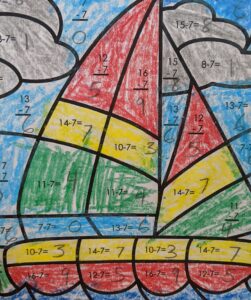School has started and we’re very slowly getting into a new rhythm and routine around here.
Thankfully, my kids’ school district is prioritizing socio-emotional well-being and community building during these first few weeks of school, in addition to helping kids and their guardians become more familiarized with the online learning systems we’ll be using for the foreseeable future.
So far, I’m already seeing wonderful evidence of resilience, rigor, compassion, and flexibility on the part of everyone. (Thank you, teachers and administrators!)
… None of which takes away from the fact that we’re all a little bit more stressed these days here in our household. Our recent weeks of “uncamping” – that is, living life at a slower pace, exploring our interests, and (for me) getting this new blog started – have ended, though we’re still holding on to as much as we can.
Yesterday I had a lovely half-hour, one-on-one (online) conference with my 7-year-old’s teacher. We talked about I.’s strengths, challenges, sensitivities, dislike of online learning, passion for art, and much more. She listened, validated, took plenty of notes, and helped me feel like my daughter’s well-being really is one of her priorities amidst everything else going on.
In terms of academic content, I shared that I. may need some additional support in math, given that she’s shifting from an exclusively first-grade math curriculum (her first grade teacher didn’t differentiate for kids capable of more advanced content) to a fully third-grade math curriculum in her new accelerated-learning 2nd grade placement.
I.’s teacher mentioned (very non-judgmentally) that if we wanted to, we could work with I. on basic math facts and operations to help her feel more confident – which makes perfect sense, but put me into a mild panic nonetheless.
Her suggestion is not an un-doable feat by any means. I’m a former elementary school teacher and math coach, for goodness sake! I have a ton of resources available in our house to help my kids with whatever content areas they need support in, as well as access to a wealth of activities and games on the internet – not to mention our school district making math curriculum content from all grade levels available online to any student with a district ID.
So, why hadn’t I done anything all summer long to help I. get comfortable with the 2nd grade math she would be hopping over this year? This seems like such a no-brainer parenting checklist item, and yet… It ended up being a “no-brainer” of a different kind for me on terms of NOT ENTERING MY BRAIN ONCE I DISMISSED IT.
Memories of our relaxed summer suddenly rushed past me in backwards fast-motion as I reflected on the “controlled chaos” of spring quarter during COVID-19, when our kids were at home with us all the time, teachers everywhere were scrambling to adjust, and the entire world was reeling with stress over a global pandemic we were both terrified by and didn’t understand enough about. I was trying to oversee my three kids’ schoolwork while also doing my own teaching, and taking a daily Norwegian class I’d (foolishly?) signed up for.
As was the case for most parents, I’m sure, each day was differently exhausting – especially given that none of my kids were able to simply “sit and do their work” on their own. They all needed scaffolding of some kind – whether that related to making sense of rapidly shifting expectations, accessing online portals, learning how to set deadlines for themselves, or dealing with emotional meltdowns as they inevitably got kicked off of Zoom meetings, couldn’t be seen by their teachers, couldn’t use the chat box, couldn’t talk or communicate while their entire class was muted, etc., etc., etc.
When I thought back specifically to doing math work with I., I recalled how utterly tedious it was to sit with her and try to figure out whether her reluctance to do her worksheets was because she was unclear on what to do, didn’t feel like doing it at that particular moment in time, couldn’t figure out the solutions, and/or was “gaming” me in some way.
(Plus, I couldn’t personally relate to any of this. I was a “good” little worksheet-completer as a kid – I loved blasting through them!)
At any rate, we would sit on her floor and color math facts worksheets together (“Ooh, fun! A color-by-number worksheet!”), and I remember wondering why she was being so deliberate and slow rather than just getting the work done so she could get back to whatever else she wanted to do. She cared a lot more about color choices than the math. She also cared more about sitting and doing something “fun” with me than the math.
But her facility with the actual math facts? Well, that was trickier. Whenever I tried doing quick drills, she would instantly get overwhelmed and stressed. (“Mom! I don’t want to do this right now!”)
I tried tapping into her love of manipulating numbers in creative ways to show her how easy it is to, for instance, quickly calculate 13 minus 5. (“Well, if you take 3 away from 13, you have 10, and then you only have 2 more to take away, and that gets you down to 8.”) This made complete sense to her, and she definitely understood it – yet she still froze up at the idea of spitting out the answers, especially when timed.
“I can’t do it! I’m getting them wrong!”
I.’s anxiety and perfectionism seemed to be preventing her from practicing and learning from mistakes. Her older sister, who also deals with anxiety, was the same way at her age (and continues to struggle with that while doing higher-level math). Their brother – not so much. He’s a “facts geek” and takes great delight in spewing off answers. They’re all different (who knew?).
(As an anecdotal aside, my husband – a software engineer with a major in electrical engineering and an informal minor in economics – has told me he was the absolute LAST person in his third grade class to memorize his times tables. So strange – AND useful to my understanding of, and compassion for, I.)
Back to last night and her teacher’s suggestion – I talked it all over with my husband (normally I leave him out of schooling issues – that’s a topic for another blog post), then decided to see what would happen if I did a quick review with I. of some core 2nd grade math ideas, just to see where she was at after the summer months.
The first question I asked her – “How many ones are there in 78?” – got a silly response:
“500!”.
“No, for real. How many ones are there in 78?”
“78!”
Umm…. Okay. Yes.
That’s actually true. There are 78 individual “ones” in 78.
I quickly reminded her about place value (“What’s place value? Oh, right, okay.”), messing up briefly myself as I explained there were 70 tens in 78.
(“Seven, not seventy!” my husband chimed in. “Whoops – yes, 7.”).
Then I revisited a similar question with I.: “How many ones are there in 68?”
No problem – there are 8 ones.
How many tens are there in 68?
“Sixty!”
Grin. This was the mistake I’d made, so she made it too.
“No really – how many?”
“Six.”
“Now, if I add a 5 here to the left, in the hundreds column, how many hundreds are there in 568?”
“Five.”
Etc. We kept going, and she seemed to have no problem going with the flow, up through a million.
“How about a billion?!?!?!?!” she asked at that point – so, we went that far.
Great. Fun. Place value seemed to be fine. I told her we would be doing more work the next day to review second grade math, and she seemed relieved to simply escape back to her room.
Meanwhile, in our bedroom (which is right next door to I.’s), my husband and I continued talking about core second grade math concepts, and what we needed to do to help I. quickly catch up. We may have sounded a little agitated, since we were in problem-solving mode – and like I said, I don’t normally involve my husband in detailed conversations around schooling (we both agree that’s my bailiwick), so I was treading in slightly uncomfortable water.
All of a sudden, in the midst of our “heated” conversation, I heard a troubling and loud thump next door.
I dropped the paper I was holding (a print out of core ideas from second grade math) and ran into her room to see what had happened. I. was lying on the floor on her back, with her eyes closed.
“I FELL OFF MY BUNK BED!” she screamed.
I quickly checked to make sure she seemed physically okay – which she was – but that was certainly an unpleasant surprise and jolt for her.
In the year+ she’s owned a bunk bed – always sleeping on the top – she has NEVER fallen off. Ever. Despite repeated warnings and concerns from us, and plenty of athletic gymnastics skirting close to and over the edge, she’s stayed focused and safe.
But last night, her equilibrium was apparently off – and it’s impossible not to associate this with the discussion she was hearing (and probably really distressed by) right next door.
To bring this story full circle, I reassured I. that everything was okay, that she could have some extra online gaming time that evening to get back into her virtual world and self-regulate (no, I didn’t explicitly use that term with her), and that she was going to be just fine with math during second grade. No worries.
For my part, I was reminded that kids ALWAYS pick up on our “panic” and concerns – or at least, mine do. I may think I’m hiding it, but I’m not. If I worry, they worry. If I’m stressed, they’re stressed.
I deliberately chose for us to have an “uncamping” summer because I wanted to maximize joy and peaceful vibes throughout the house. My goal now is to gradually bring “formal schooling” back in without upsetting everyone’s well-being.
Naturally, I’ll be reporting back.
Copyright © 2020 by HalfoftheTruth.org. Please feel free to share with attribution.

